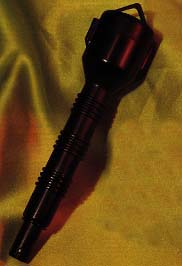
Image: Laura Copenhaver
Though he’s sold a scant 500 of them, Defender-DNA inventor Bob Smith is optimistic about his new product. “I get so excited when I look at it now,” he says. “It could go so far it’s unreal.” A standard personal alarm supplemented by an auto-injecting needle, the device is supposed to collect a DNA sample from one’s would-be attacker. Currently, such a sample would be useful only if the assailant were one of the 141,600 violent or sex offenders cataloged in the FBI’s National DNA Index System, or one of the approximately 260,000 in state databases. But many politicians and police departments across the country advocate adding DNA samples of nonviolent criminals to their local databases; New York City police commissioner Howard Safir would like to take a sample from everyone who is merely arrested. Widening the pool even more, New York City mayor Rudolph Giuliani recently said he favors obtaining the genetic fingerprints of all the city’s newborns. Smith says his product is the defense of the future.











